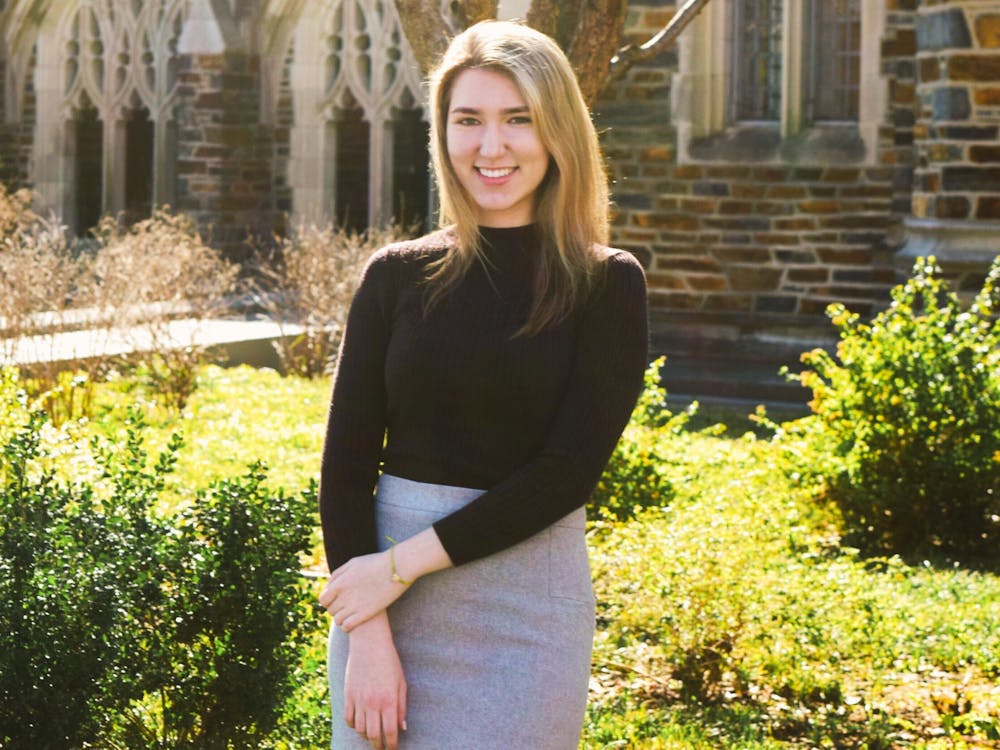Junior Valeria Silombria brings a commitment to addressing the needs of low-income students to her campaign for Duke Student Government president.
Silombria would aim to focus on mental health on campus, improve connections with Durham, work on a hate speech and hidden bias policy, improve equity and make campus more affordable for low-income students.
The final priority is personal.
“I’m a low-income student, and a lot of this comes from first-hand experience, but also talking to a lot of my friends, and through my scholarship,” said Silombria, who is a Rubenstein Scholar—a full-ride scholarship for first-generation, low-income students committed to social engagement. “And I wrote down a bunch of things that students could use help on, and I’m going to implement those ideas.”
Some low-income students don’t have access to business attire for interviews, Silombria said, and she wants to make access to nice clothing easier. Students should also be able to apply for more food points or receive vouchers for food if they stay on campus over breaks, she added.
“I’ve definitely stayed [over] breaks, and it’s been extremely difficult just trying to manage food points and money, and that’s something students should not worry about,” Silombria said.
Silombria is currently vice president for Durham and regional affairs for DSG, and she served as a senator on the committee for her first two years at Duke. She has spearheaded several projects, including a civic engagement training for senators, and worked with two other senators to bring awareness to Durham’s 150th birthday celebration.
This year, her focus has shifted to transportation. She has talked to Duke Partnership for Service about transportation costs for service groups, and Silombria said she wants to push the administration to come up with a replacement for the now-defunct Bull City Connector.
She has also made progress on affordability, successfully pushing to allow those running for DSG offices to receive funding before a campaign, instead of asking for a refund after.
“I didn’t want someone to not run for DSG just because… [they] don’t want to put $50 down and not get it later,” she said, noting that refunds can take a long time.
When it comes to mental health, Silombria wants to make it easier for students to transition from Counseling and Psychological Services to off-campus providers, which could also involve providing transportation.
Another goal is to push Duke to develop a hate speech and hidden bias policy, which she said would be her first priority upon taking office.
“I think it’s just so important. Like recently, with the swastika, it’s just so insensitive to send students to class after something like that happened with just an email—who’s going to care about going to class after your whole belief system is targeted?” she said, referring to a recent incident in which a swastika was painted under the East Campus Bridge.
That’s a lot for anyone to accomplish. But according to David Rabiner—director of the Academic Advising Center, as well as Silombria’s academic dean and former college adviser—she’s a great fit for the job.
“I know she’d take it very seriously, she’d do the best she can, and she’s really kind of a role model in terms of how she tries to conduct herself here,” he said.
Rabiner explained that Silombria stood out for how appreciative she was for the opportunity to come to Duke. He highlighted her current role in DSG, working to get more students involved in the Durham community, as an example of how she is “deeply committed to a more equitable experience” for students here.
For junior Michael Wen, who has been friends with Silombria since his first year at Duke, her personal qualities stand out.
Get The Chronicle straight to your inbox
Sign up for our weekly newsletter. Cancel at any time.
“I think Valeria is a very compassionate person,” he said. “I think she cares very deeply about others, about what she does, about her commitments. She’s just a light—every time I see her, I always smile.”
He highlighted Silombria’s commitment to listening, especially to people with different backgrounds and identities. She has asked him about the international experience, he said, and talked to DACA recipients on campus.
“She wants to know what the issues are, and because of that, I think she’ll make a phenomenal DSG president,” he said.
Matthew Griffin was editor-in-chief of The Chronicle's 116th volume.

